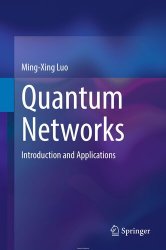Quantum Networks: Introduction and Applications
- Добавил: literator
- Дата: 28-10-2024, 11:34
- Комментариев: 0
 Название: Quantum Networks: Introduction and Applications
Название: Quantum Networks: Introduction and ApplicationsАвтор: Ming-Xing Luo
Издательство: Springer
Год: 2024
Страниц: 387
Язык: английский
Формат: pdf (true)
Размер: 10.1 MB
This book provides a comprehensive overview of the rapidly advancing research in quantum networks, both in theory and application. While the classical internet has become essential in our daily lives, its communication techniques have limitations, such as vulnerability to interception and eavesdropping. Quantum networks, by transmitting quantum qubits, address these security concerns using the principles of quantum mechanics, such as superposition, no-cloning, and Heisenberg uncertainty. Kimble first proposed the concept of a quantum internet in 2008, envisioning a network that harnesses quantum devices and laws to transmit information. Wehner and colleagues reviewed the steps necessary to achieve a quantum internet in 2018, outlining development stages leading to increasingly powerful applications. While a fully functional quantum internet is still in progress, significant advances have been made through experiments, such as satellite-based quantum key distribution networks and quantum metropolitan area networks. This book aims to provide a unified theoretical framework for students and researchers interested in the quantum Internet, offering insights into topics like network communication theory, secure communication, distributed computation, nonlocality, and quantum configuration. By presenting cutting-edge research and potential applications in the field of quantum information processing, including the quantum Internet, this book stands out as a valuable resource for beginners, undergraduate students, graduate students, and researchers in physics, computer science, and information science. It bridges the gap between theoretical perspectives and practical applications, offering a comprehensive guide to the exciting possibilities of quantum networks.
A quantum Internet, as one of the most important next-generation networks, has attracted great interest from many countries around the world. Building a quantum Internet will provide competitive advantages in related industries and may open up a new world of innovations. Quantum Internet is fast, secure, and scalable. The goal of the Chapter 2 is to present a comprehensive framework for a quantum Internet. The classical internet (CInternet) consists of end-nodes connected by routers, and uses packet transmission to transmit voice, video, or data. The OSI and TCP/IP models provide a standardized approach to designing complex communication networks by separating functions into layers with specific protocols. The QInternet extends the CInternet to interconnect quantum networks for transmitting qubits and distributing entangled states. While classical protocols can’t be used in quantum communications due to the special laws of quantum mechanics that govern the behavior of qubits, entanglement provides stronger correlations among legal participants. The QInternet is composed of both classical and quantum nodes, and hybrid networks can complete complex services using different network parts. Quantum computers can also provide powerful computational capabilities for optimizing computation tasks in networks.
While some books have focused on special aspects of quantum computing, quantum communication, and quantum information theory. This is not enough for advanced students or researchers, especially the lack of recent results including but not limited to hot topics, such as quantum internet, distributed quantum computation, quantum network communication, and nonlocality of entangled networks. Besides, entanglement as another aspect of quantum physics is far beyond the classical description. Thus the goal of this proposal is to complete theoretical topics related to quantum networks consisting of entangled systems. It will include various fundamental but most recent publications of wide topics on quantum Internet. Our motivation is to provide a reference for both graduated students and experts who are interested in this challenging, vigorous, and fascinating field. It is designed for a reader having some basic knowledge of quantum mechanics, linear algebra, and Computer Science but not being familiar with quantum networks particularly, large-scale quantum information processing.
Скачать Quantum Networks: Introduction and Applications
Внимание
Уважаемый посетитель, Вы зашли на сайт как незарегистрированный пользователь.
Мы рекомендуем Вам зарегистрироваться либо войти на сайт под своим именем.
Уважаемый посетитель, Вы зашли на сайт как незарегистрированный пользователь.
Мы рекомендуем Вам зарегистрироваться либо войти на сайт под своим именем.
Информация
Посетители, находящиеся в группе Гости, не могут оставлять комментарии к данной публикации.
Посетители, находящиеся в группе Гости, не могут оставлять комментарии к данной публикации.
